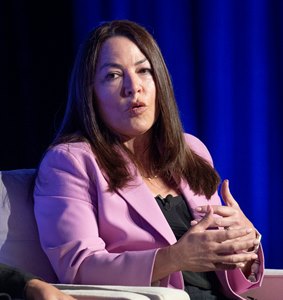HISA, HIWU Try to Answer Questions in Town Hall


With the Horseracing Integrity and Safety Authority approaching the six-month mark since its Anti-Doping Medication and Control Program took effect, it held a second town hall Nov. 15.
Led by HISA CEO Lisa Lazarus, who was joined by Horseracing Integrity and Welfare Unit executive director Ben Mosier and HIWU chief of science Dr. Mary Scollay, the town hall provided stakeholders an opportunity to ask questions as they continue to acclimate to the program, which to date has tested more than 42,000 horses.
The session opened with Mosier discussing enforcement changes to provisional suspensions which were announced Nov. 13. Scollay then discussed science and substance updates, which included the harmonization of limit for detection for metformin and changes to enforcement concerning the use of electrolytes, as well as examples of pending rule changes for 2024. Those changes include the recategorization of certain substances including Altrenogest on the prohibited list and in certain circumstances, imposition of less severe sanctions for positive tests for human substances of abuse.
Diving into the questions, one issue that has been a hot topic is the affordability of a defense for covered persons who have insufficient funds to pay for an attorney. Lazarus went through the process starting when someone receives notification of an alleged violation.
"They will get the opportunity at that point in time to first contact the ombudsman Alan Foreman. ... And Alan's role is really to help explain to any covered persons, essentially, what the process is, what they need to do next, how to best protect themselves, basically anything at all that they want to know or understand about the process and they don't feel confused or without the proper resources to manage," Lazarus said.
She added, "After that, if they want a B sample and they don't have the funds to pay for the cost of the sample, they can make that claim and through a process with HIWU. If they don't have the funds for the sample that will be paid for them."
Lazarus noted that there is now a pro bono panel of attorneys who will provide their services to covered persons provided they are unable to pay for legal aid.
When asked whether any substances had been detected that previously had not been by racing commissions, Mosier said that it is "a tough question to definitively answer as a yes or no given the reporting structure previously." But he noted that there is at least one substance that had not been recorded "in quite some time."
Other takeaways include:
* Scollay said that the use of biological passport testing is under investigation and may have "potential relevancy" in the future.
* She also said that advances are being made identifying performance-enhancing drugs that have previously been undetectable. Scollay said, "We've gotten good intelligence and tremendous cooperation across the laboratories in terms of sharing intelligence and sharing information."
The Federal Trade Commission, which oversees HISA, voted 3-0 to publish HISA's proposed budget in the Federal Register. This is required so that the proposed budget is open for public comment, which must be submitted within 14 days of publication.
Asked what the FTC's timeline is to review and vote on redline changes, Lazarus said until that occurs, present rules remain in place.
"They have essentially stayed, which means frozen, the cases and lifted the suspensions of those covered persons that would be favorably impacted by the new rules," she said.
